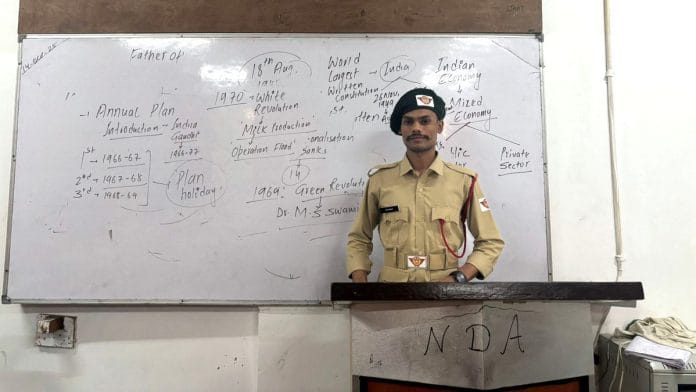Meerut: The alarm goes off at 5 am sharp and students swing out of their bunk beds in almost one swift movement. Within half an hour, they’re in khaki uniforms, doing laps, self-defence drills, push-ups, and marching through streets named after fallen soldiers. It is not a cantonment town, but a private coaching academy on the dusty edge of the Delhi-Meerut Expressway in Partapur, a few kilometres away from Meerut Cantt.
“Jai Hind,” the green-capped students say firmly in greeting at Subharti Defence Academy as they march past, shoulder to shoulder, in the 250-acre campus. Watching them closely is Colonel (Retd) Rajesh Tyagi, the director of academy.
“This is the environment they will face when they join the Army. We’re not just teaching them. We are ensuring they live the defence routine,” said Tyagi.
In the last decade the “Army dream” has spawned a booming, organised military coaching sector in tier-2 and tier-3 cities such Meerut, Sikar, and Rohtak. These new academies are a leap up from the small, informal setups run by ex-servicemen in military-obsessed states like Rajasthan, Uttar Pradesh, and Haryana. They are not just training future jawans but aspiring officers. The new coaching centres are full-fledged academies with hostels, physical grounds, personality development sessions, and classes to crack competitive exams, including the NDA, CDS, and AFCAT exams.
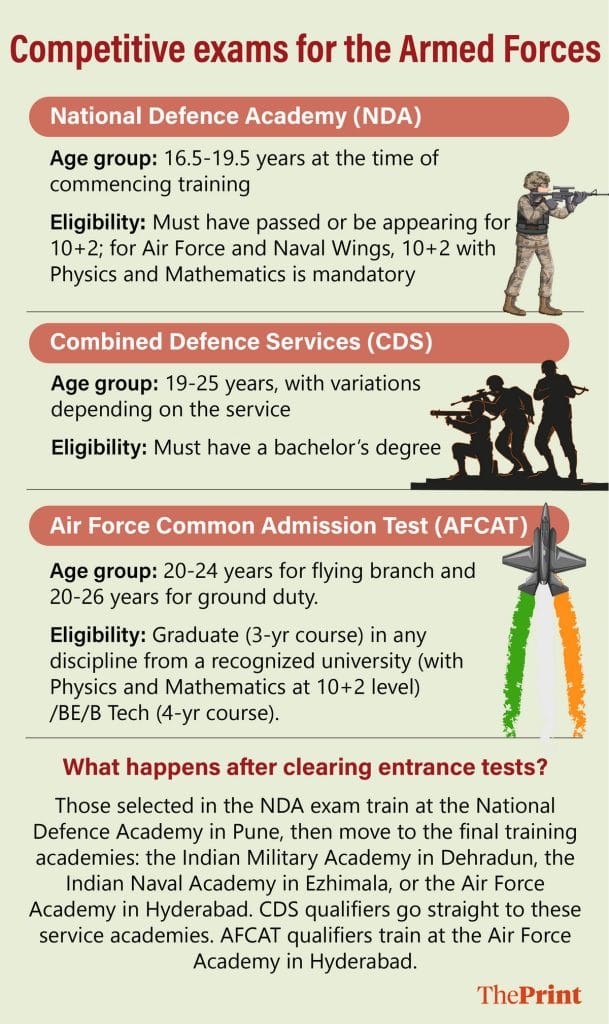
If UPSC civil services aspirants have Byju’s and Drishti IAS, then aspirants in the elite, military officer-entry pipeline have the likes of Subharti, Baalnoi Academy, and Georgians Academy. The competition is just as cut-throat.
The UPSC conducts the NDA and the CDS exams twice a year. Those who pass the written tests have to then clear the gruelling five-day Services Selection Board (SSB) process that assesses whether candidates have the mettle to become officers. It comprises psychological tests, group discussions, and field tasks held at 14 centres across the country. Only 0.2-0.3 per cent of candidates make it through.
In UPSC or other courses, people come for money. Here, they come with the bhaav for the nation. Nationalism and patriotism are the only emotions we instill. We prepare them to be ready for the supreme sacrifice
-Colonel (Retd) Rajesh Tyagi, director of Subharti Defence Academy
Around 5-6 lakh people apply for each NDA exam, according to the website of the Indian Defence Academy in Dehradun. Of these, 2-2.5 lakh candidates appear for the written test with only 8,000-9,000 making it through to the SSB round. A few hundred are finally selected; for last year’s NDA-II exam, 792 candidates made it.
At Subharti, it is claimed that more than 450 students have cleared the NDA and CDS exams since it was founded in 2021. The academy runs separate NDA and CDS batches, with shared written classes for maths, physics, and other common subjects. It also trains candidates for the Agniveer scheme and state-police exams.
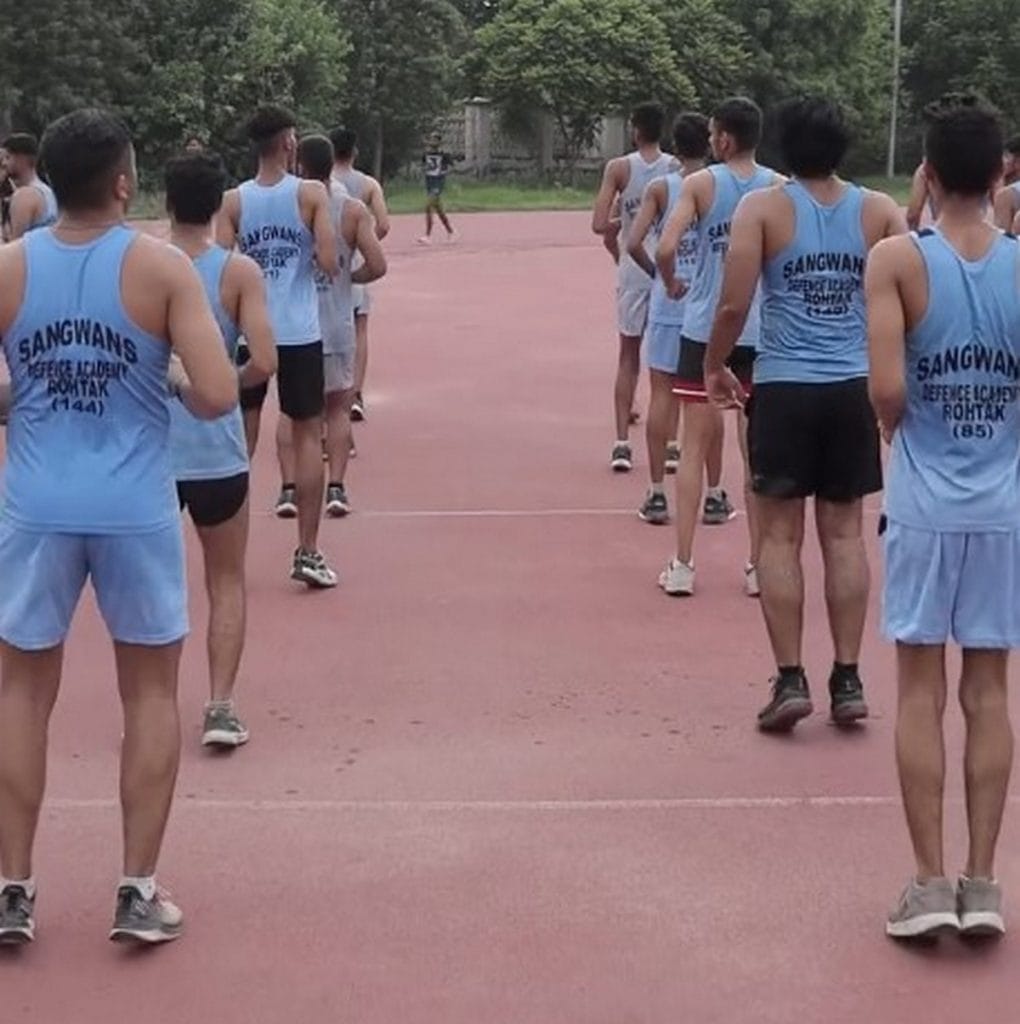
The business is competitive and selection rates are the biggest currency. Subharti charges between Rs 10,000 and Rs 60,000 for a six-month residential course. The long-standing Baalnoi Academy, with branches in Delhi and Jaipur, offers shorter, intensive two- to three-week SSB training programmes of seven hours a day, seven days a week, with fees between Rs 21,000 and Rs 28,000.
The advertising is loud and relentless on social media, with words like commando and yodha (warrior) everywhere. Academies regularly share photos of successful local candidates, whether they’ve cleared an entrance test or become cadets.
“India’s military coaching industry has moved beyond metros. Cities like Meerut, Nagpur and Kolhapur are now producing serious aspirants,” said Sanjay Pathak, a retired Naval captain who has served in the Defence Institute of Psychological Research and spent over 13 years interviewing candidates for SSB boards. “Earlier, hubs were limited to Delhi, Chandigarh and Dehradun, but now smaller cities have built coaching ecosystems, driven by advertisements and early success stories.”
Also Read: New British boarding schools are here. The latest accessory for India’s rich
Making of a soldier
At 8 am, the Subharti campus goes from drill mode to classroom mode. After a quick bath and breakfast, the aspirants settle in for an eight-hour stretch of classes.
The academic day begins with “personality development”, a key subject especially for students from rural pockets who struggle with English, public speaking, and social confidence.
“Personality cannot be developed overnight,” Tyagi said. “We build confidence, they move from Hindi to English over six months. Our goal is to not put them in the spotlight, but to remove the fear of it.”
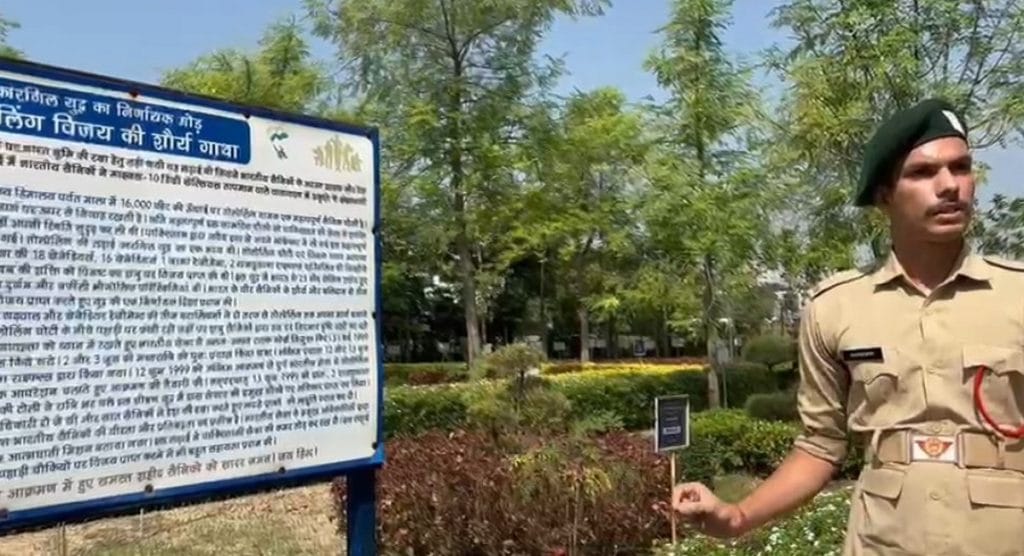
This ‘personality development’ is geared toward the officer-like qualities (OLQs) assessed in the SSB interview, encompassing 15 personality traits and capabilities under categories such as planning, social adjustment, social effectiveness, and dynamism. Honing these qualities is built into the day-to-day routine at the academy, which is attended by students not just from Meerut but also Bulandshahr, Shamli, Hapur, Saharanpur, and neighbouring districts. Currently, around 100 NDA and CDS aspirants are enrolled here.
Students eat in a mess, where they are taught dining etiquette like using a fork and knife. Teachers said the real groundwork is language; once students get comfortable with English, their confidence grows, and the rest flows from there. Former SSB interviewers come in to train and assess them as well.
For the written exam, subject instructors and professional trainers take over.
Inside one classroom, a science lesson is in full swing. Fifteen students sit with their backs straight as the trainer writes out words on the whiteboard: gramophone, telescope, steam engine, television, radium. One by one, he asks students who invented what. Hands shoot up. Some answer correctly, some make mistakes. They all take notes.
People say it’s unsafe for girls, but I know that only this job will give me respect and discipline. It was my father’s dream to become an Army officer, but he couldn’t pass the exam
-Nandini Raghav, CDS exam aspirant
Among these students are three or four women, including Nandini Raghav, 21, a fresh graduate in zoology, botany and chemistry. She joined the academy six months ago to prepare for the CDS exam.
“It was my father’s dream to become an Army officer, but he couldn’t pass the exam,” said Raghav, whose family lives in Shamli.
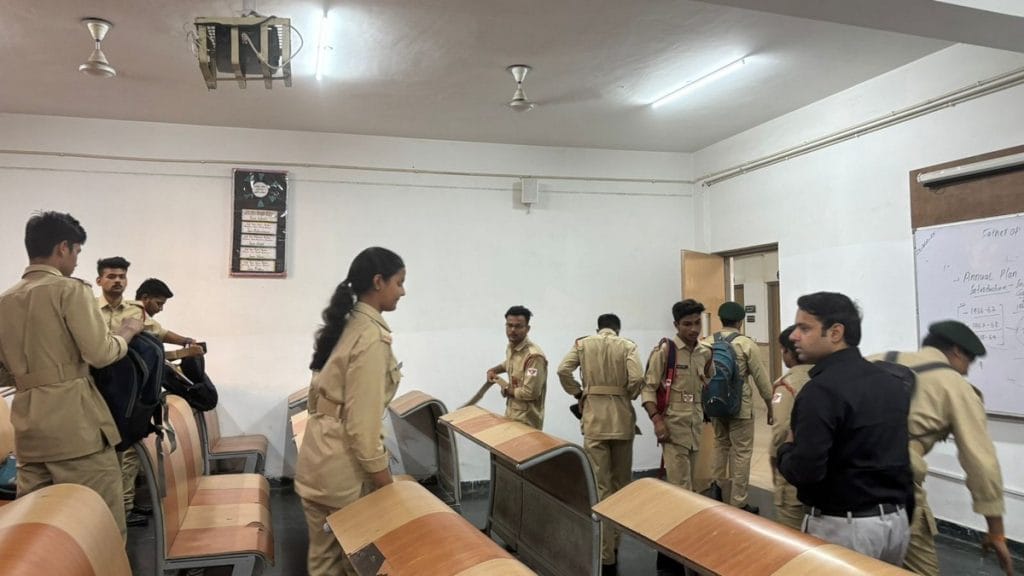
Women were first allowed to join NDA only in 2022, following a Supreme Court ruling the previous year. In the 2025 batch, 17 female cadets graduated alongside over 300 male cadets. Currently, there are 121 women cadets at the NDA.
Academies also increasingly target girls with lines like “Ladkiyon ki hui jeet, NDA hum aarahe hain” (Girls have won, we’re coming for the NDA) and images of women soldiers marching on Republic Day.
Her own dream began when she was four and watched the Hindi TV serial Diya Aur Baati Hum, whose lead character was an Army officer.
“Since then, I wanted to become an officer. People say it’s unsafe for girls, but I know that only this job will give me respect and discipline,” she said.
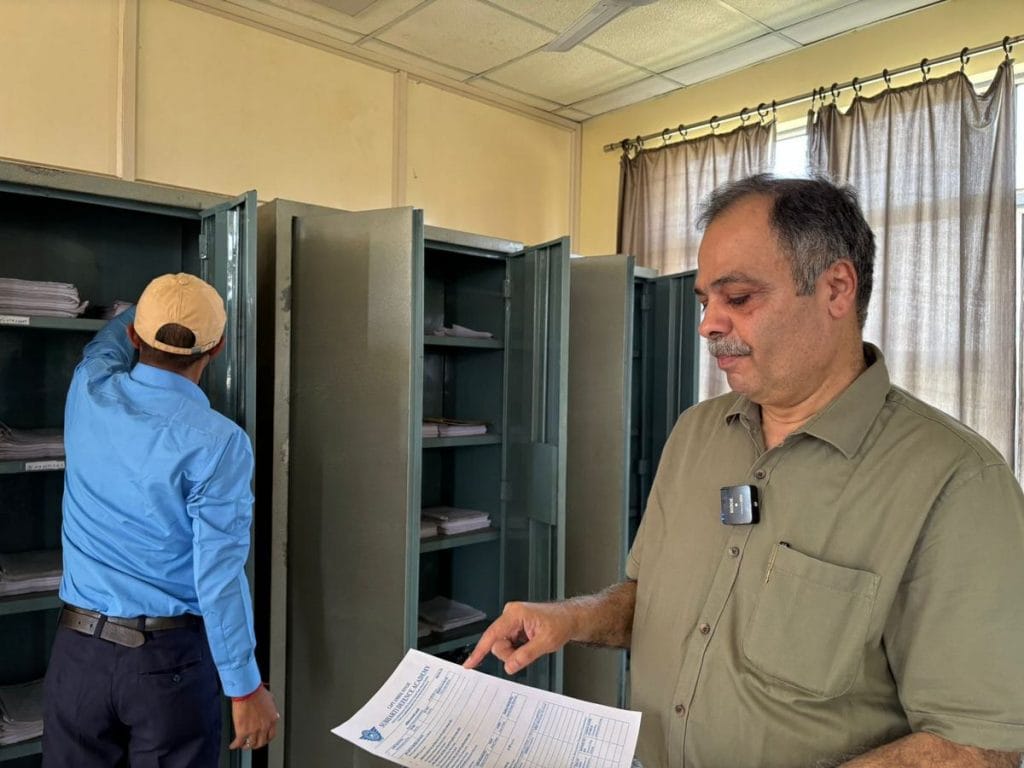
Director Tyagi, who started the institute in 2023 within Subharti University, travels across the country to recruit students— from city schools to rural assemblies. He gives motivational talks, narrates how wars were fought, and lays out the perks officers get: the stipend, the canteen, the adventure sports, and the starting salary of around Rs 1 lakh.
“Our goal is to give back to the country,” he added.
Tyagi insists that defence coaching is unlike any other.
“In UPSC or other courses, people come for money. Here, they come with the bhaav for the nation. Nationalism and patriotism are the only emotions we instill. We prepare them to be ready for the supreme sacrifice.”
To drum in these values, there are visits from commissioned officers during the SSB preparation rounds, as well as regular motivational talks. Popular Hindi films on the military like Lakshya, Border and URI are assigned as homework. Students aren’t quizzed on them; the films are meant purely to ignite patriotism.
“These films remind students what the uniform stands for,” Tyagi said. “When they sit with other aspirants, it feels infectious.”
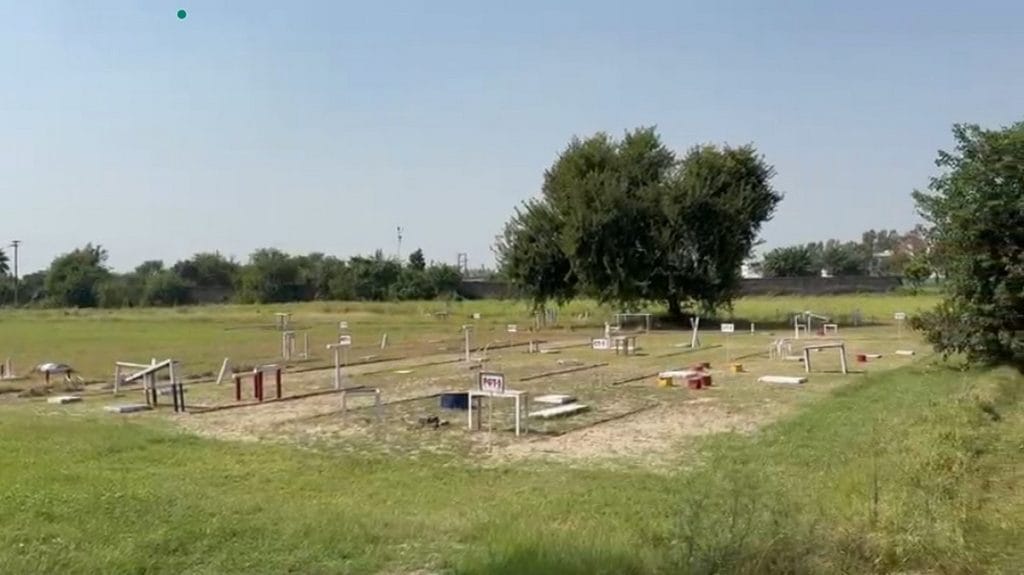
Building ‘officer-like qualities’ at speed
Not every military coaching academy has the luxury of a full campus. In west Delhi’s Dwarka, Georgians Defence Academy spans two floors sitting above a motorcycle showroom. What it lacks in space, it tries to make up with aggressive branding.
Four to five glass-walled classrooms are crammed with batches preparing for different exams. The institute’s bona fides are displayed in the form of flex banners of selected students, their passport photos arranged in neat grids like a gallery of achievement.
The academy, which was started in 2013 by a group of ex-Army officers and graduates of the Rashtriya Military School (formerly King George’s Royal Indian Military College), specialises in coaching for the written NDA and CDS exams as well as for SSB preparation.
Its SSB interview course costs Rs 15,000 for 15-25 days. The two-year NDA Foundation (CBSE plus NDA) is Rs 2.6 lakh. A four- or six-month NDA comprehensive programme costs Rs 30,000.
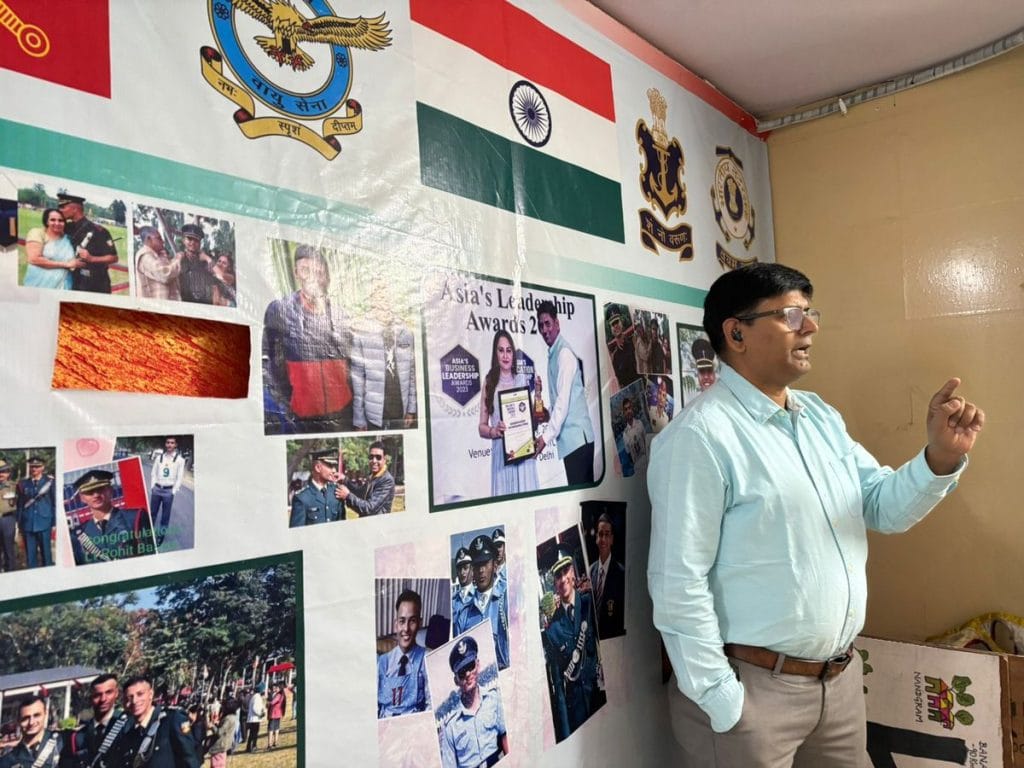
On a Friday morning, a group discussion is about to start. Seven students sit in a circle, postures perfect, hands folded on the table. The topic is social media, religion, and politics. As soon as founder Kunwar Pratap Singh gives a nod, the argumentative Indian in them snaps to life. Some speak fluently, others stumble. They agree, argue, interrupt, push back.
“Deepfakes have increased,” said one student. “But so has religious propaganda,” another jumped in. When a student says politics and religion are interconnected and that “political leaders urge youth to go to extreme levels”, the temperature briefly rises before the group steers itself back to safer ground: social media.
States like Haryana, Rajasthan, Punjab, Jammu and Kashmir, Uttarakhand have largely sent most jawans, there’s legacy here, and culture of war, historically
-Kunwar Pratap Singh, founder of Georgians Defence Academy
The chaos is by design. This exercise is a mock-up of the Group Task Officer (GTO) round in the SSB.
“This selection is based on the concept of manasa, vacha and karmana [thought, speech, and deed],” Singh said. Examiners assess a candidate’s personality in totality, even though there are no right or wrong answers in the SSB.
When the discussion is over, Singh gives the students feedback on how they came across. “When you criticise, choose your words wisely,” he told one. “Your tone shows your character. Don’t stop before you speak. Remember, politics isn’t always a negative word. It is also a profession.”
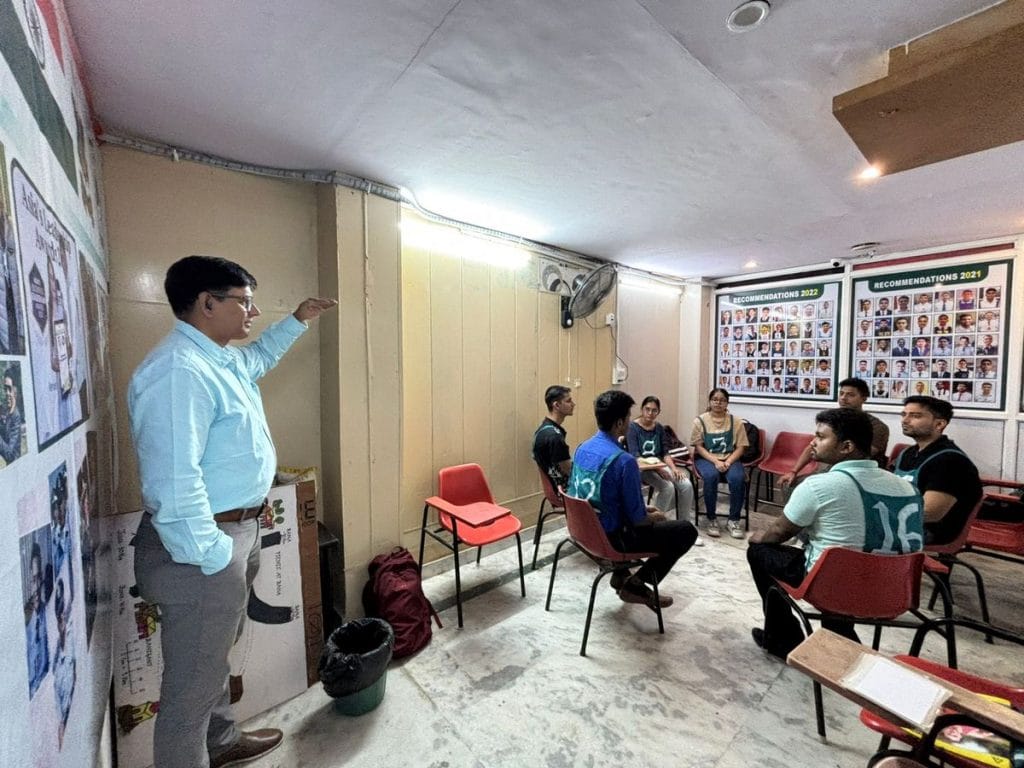
For this round, there is no time for preparation. Candidates are expected to think on their feet. They are expected to show clarity and composure.
“It’s not just about knowledge,” Singh said. “They test your psyche, your ability to lead, how you take decisions under pressure. This is what Army life demands.”
Across the city in Janakpuri, Baalnoi Academy runs similar sessions in a house carved into a warren of classrooms. On the covered rooftop, a Progressive Group Task is underway.
Twenty students in track pants and sneakers gather around a makeshift obstacle course. Wooden planks, ropes, and rods are scattered around. The mission is to cross from one platform to another without touching the ground.
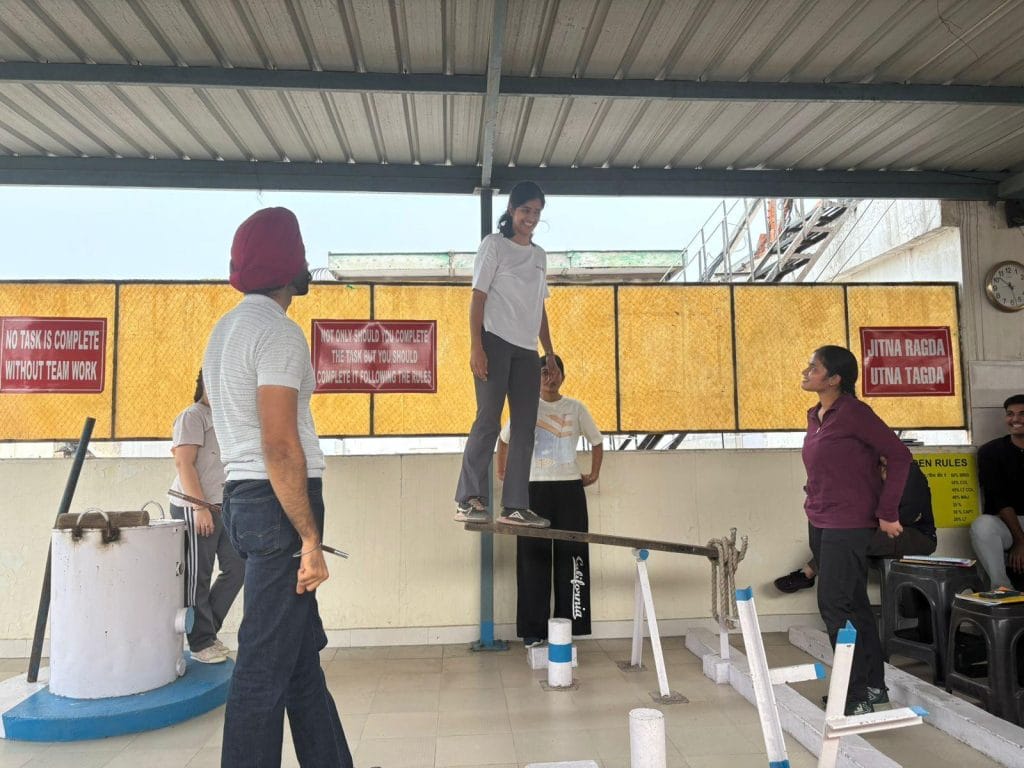
“Phatta phasa de. Rassi tight bandh,” he shouts—Fit the plank properly. Tie the rope tight. The students scramble to tie knots, breathing heavily and trying to strategise. Kalsi keeps turning up the stress meter.
“Her life depends on you three,” he calls out as one of the girls attempts to balance across a narrow plank. When somebody fumbles, he is quick to point it out: “Got the idea? I am not your dushman [enemy]!”
The task is part logic, part leadership. It tests teamwork and courage.
“Fauj mein kabhi ideas na do [Don’t try to give ideas in the Army]” he jokes when a student suggests a shortcut. The laughter breaks the tension.
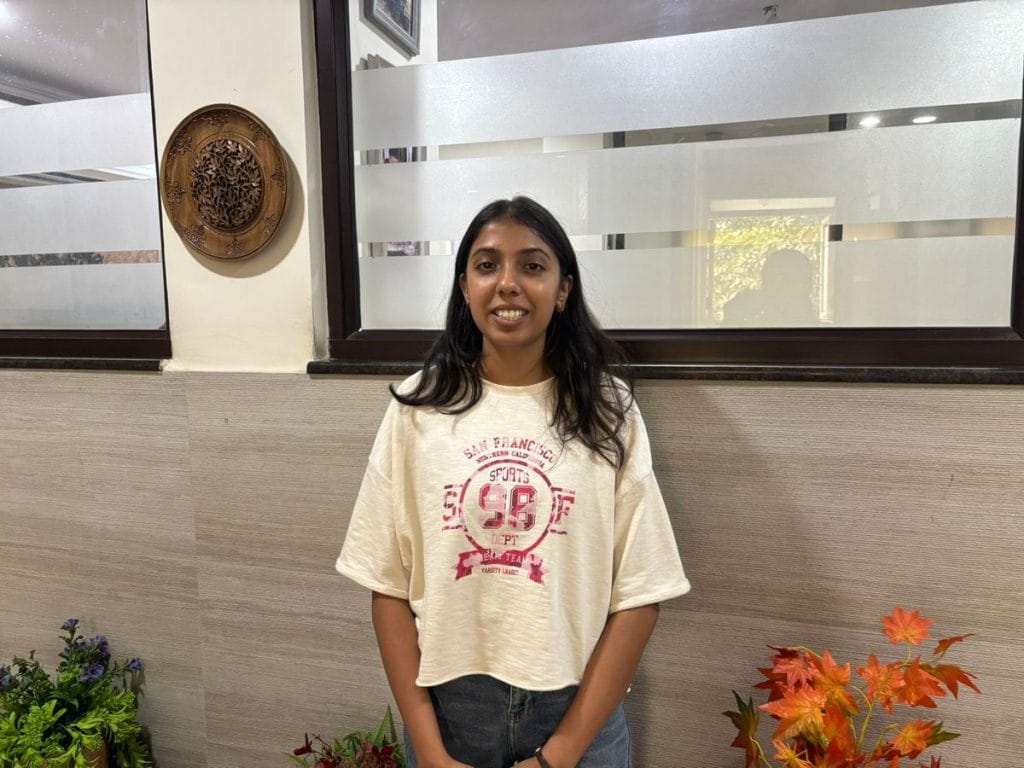
At the edge of the room, 16-year-old Jatin Kaushik takes a break. From Mahendergarh in Haryana, he cleared the NDA written exam on his first attempt a few months ago.
“My grandfather’s brother was an officer,” he said. “His lifestyle impressed me. He was punctual and respected.”
Now, Kaushik is preparing and revising for the SSB round.
“Coachings are needed. They help us prepare mentally. We understand the competition we’re in,” he said. “Without it, people panic.”
In another batch, 21-year-old Shivani Tomar is writing her mock test for paper I. Her Army aspiration started when her mother was employed as a domestic worker in the Delhi Cantt area. The lifestyle, the uniforms, of those Army officers inspired her.
A student of Miranda College, Tomar decided to enroll after she was laid off from a private sector job she’d taken up to support the family.
“Layoff has become a common phenomenon in the private sector,” she said. “Long hours, low pay, constant pressure. Then I decided to take the Army track. There’s discipline, respect and stability. I need that.”
Who is running the industry?
India’s military-coaching industry began taking shape in the late 1990s when a handful of retired officers started turning their experience into mentorship.
Among the first was Major H S Kalsi, a second-generation 1981-batch officer of 9 Rajputana Rifles and a former SSB Group Testing Officer. He set up Baalnoi Academy in 1997.
“We started because there was a need. There was only one coaching centre in Delhi in 1997, and now there are multiple centres,” he said. “A student I once failed in the SSB told me, ‘Sir, start coaching, others need to know what the real test is.’”
From that accidental beginning in Janakpuri, Baalnoi expanded to Jaipur and East Delhi as well, training over 1.5 lakh aspirants and helping 14,000 officers enter the forces.
There was only one coaching centre in Delhi in 1997, and now there are multiple centres. A student I once failed in the SSB told me, ‘Sir, start coaching, others need to know what the real test is’
-Major H S Kalsi, founder of Baalnoi Academy
Most of these coaching academies have followed a similar arc. They were founded by ex-servicemen driven by both a sense of public service and market logic.
But for Georgians Defence Academy’s founder Kunwar Pratap Singh, his own failure was the inspiration.
The son of an Army officer, he went to the Rashtriya Military School and had his life path cut out for him. Until he gave the CDS exam and fell short by a few marks. Moving to the education sector, he says, is his way of making sure other aspirants are better prepared.
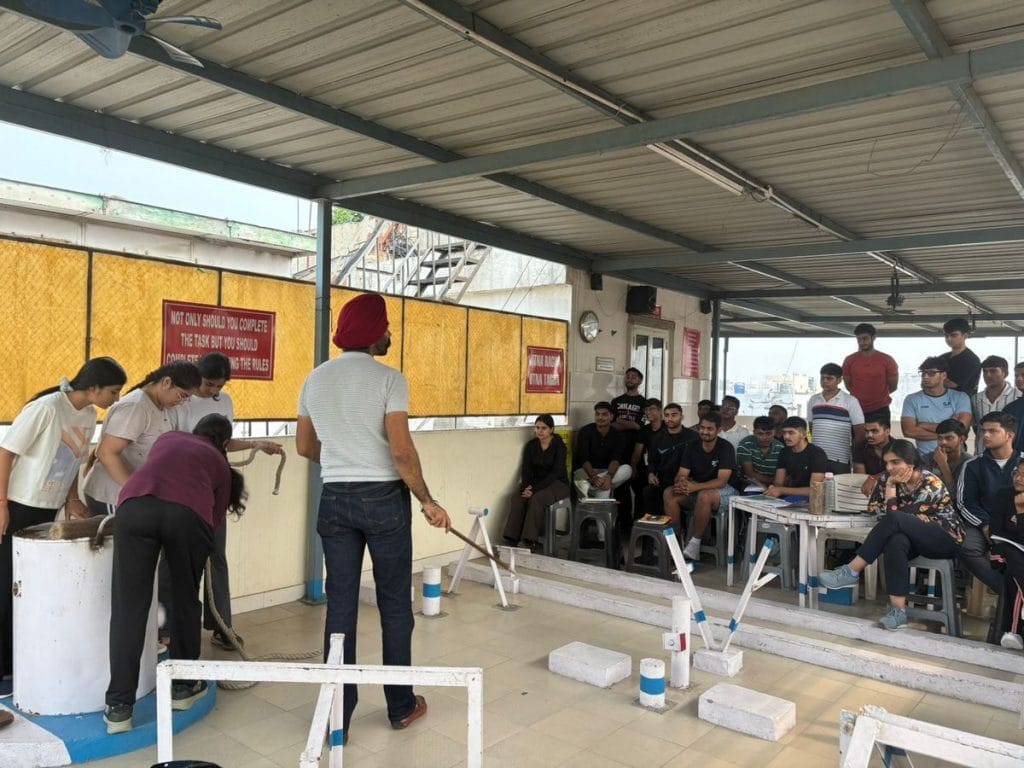
Even in traditional military coaching hubs such as Delhi, Dehradun and Chandigarh, there were only a handful of institutes until about a decade ago, according to him. Singh said the boom began when the competitive-exam culture took off with UPSC, CLAT and JEE.
He is now expanding beyond Delhi to Jaipur and Pathankot as demand rises in tier-2 and tier-3 cities, especially in states where there is a strong tradition of sending young men to the military.
“States like Haryana, Rajasthan, Punjab, Jammu and Kashmir, Uttarakhand have largely sent most jawans, there’s legacy here, and culture of war, historically,” Singh added.
Also Read: Inside UP’s PM Shri testing ground: Labs, smart boards and a race to catch up
Small-town coaching boom
In the military-besotted belt of North India, there’s coaching on tap, spanning the gamut from self-styled ‘Army trainers’ holding drills on public grounds to branches of big coaching academies like Trishul to up-and-coming local institutes with solid infrastructure.
As demand grew, so did the professionalism. Psychologists, SSB assessors, and communication trainers now work at these institutes. Some offer residential campuses and an eight-hour regimented schedule. Others leverage edtech with online test series, Telegram groups, and remote mentoring.
In Lucknow, one of the biggest brands is Target Defence Academy, started in 2020 by Sainik School alumnus Sachin Yadav, who describes himself on the website as “SSB recommended”. The academy has a cantonment-style routine where all aspirants wear a light-blue uniform and follow a fixed day-long regime.
It’s a similar set-up at Govindam Defence Academy in Sikar, Rajasthan. It claims more than 2,845 defence selections and has specialised courses for different services. Its residential programme is tightly regimented, starting from a 5 am wake-up to “toilet-fresh”, physical training, classes, self-study and “night rest” at 10.30 pm. Haryana’s Rohtak, meanwhile, has the more long-standing Sangwans Defence Academy, founded by the retired submariner Dinesh Sangwan, and complete with AC classrooms, obstacle course, and the claim of “more than 13,500 selections in the last 20 years.”
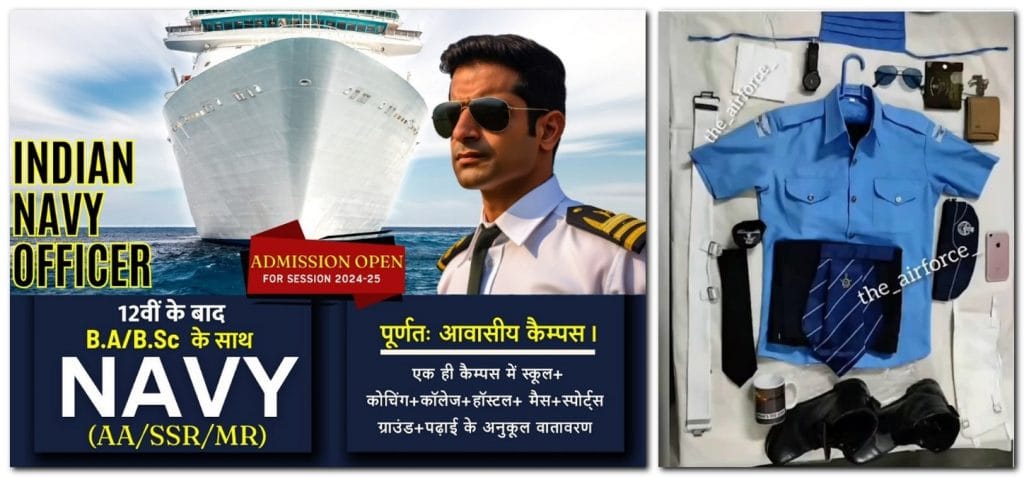
The market is awash with academies named after military lore or films, from Lakshya to Shaurya to Trishul. All claim to have the “highest selection rate” and advertise aggressively on Instagram and Telegram. Some slogans go for a noble ring: “Shiksha, seva, sanskar, rashtrayata” (education, service, values, nationhood) or “Making an officer”. Others are more down to earth: “Success for Army” or “Trishul jao, vardi paao” (Go to Trishul, earn the uniform). The reels are a stream of shirtless runs at dawn, proud salutes, silhouettes of soldiers pointing guns.
Even smaller institutes have a well-honed promotions game, such as the popular “Aditya Shukla Sir” of Kanpur who regularly shares reels of students doing long jumps and posing in fauji garb for his over 72,000 followers.
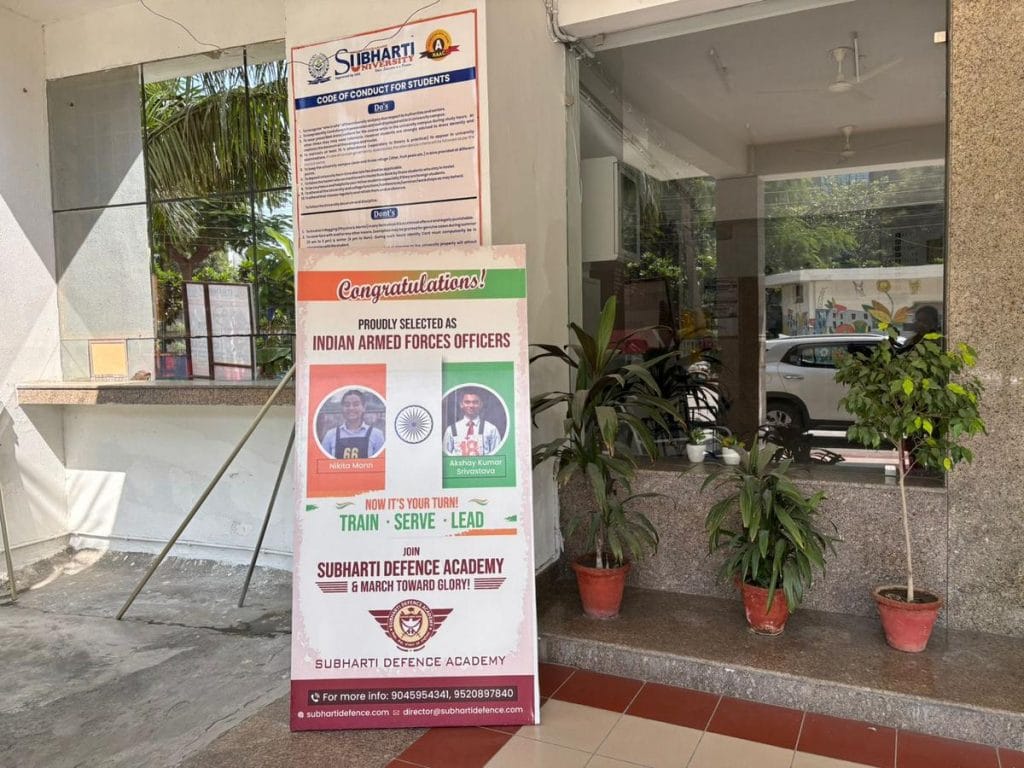
For students and their families, these institutes offer a guided route into what seems like a stable, respectable profession at a time of job uncertainty.
“Private courses and jobs are plenty, but there’s no guarantee,” said Singh. “If you want to earn money then you take private jobs, but here, students come ready for a sacrifice.”
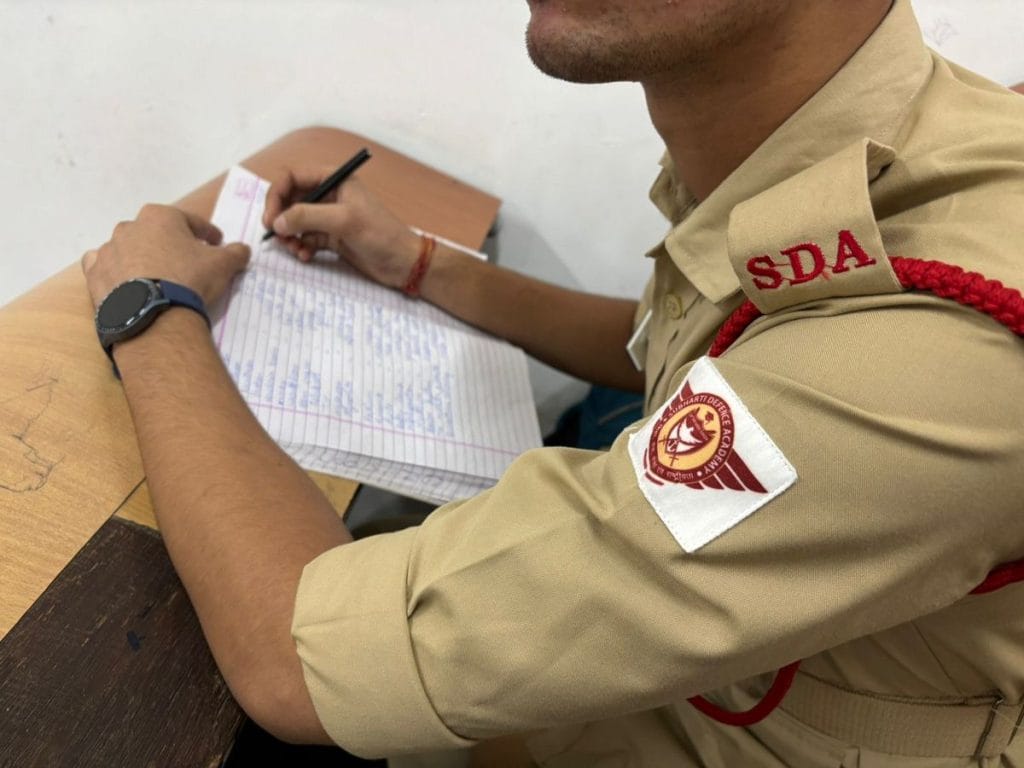
Back in Meerut, Manish Kumar’s dream of the uniform began when he was a child growing up in Meerut Cantt.
“It was my father’s dream, who was also in the Army. He served through ranks from 1985 to 2021,” he said.
Kumar first attempted the NDA exam in Class XII in 2016 but couldn’t crack it. He kept reattempting even as he acquired a BSc in computer science and later an MSc. He studied on his own, took online tests, and finally decided to join Subharti.
After at least fourteen attempts at the NDA and CDS exams, Kumar finally earned his stars in 2022. Two years later, he got his commission letter. He’s grateful that his father, who died a month later, got to see it.
In March 2024, when the letter arrived, his father was bedridden and half paralysed. Hearing the news, he picked up a pen with his left hand and scrawled three words on a piece of paper: “Lt Manish Kumar.”
(Edited by Asavari Singh)



